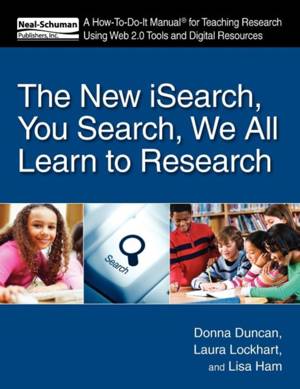
- Afhalen na 1 uur in een winkel met voorraad
- Gratis thuislevering in België vanaf € 30
- Ruim aanbod met 7 miljoen producten
- Afhalen na 1 uur in een winkel met voorraad
- Gratis thuislevering in België vanaf € 30
- Ruim aanbod met 7 miljoen producten
Zoeken
The New Isearch, You Search, We All Learn to Research
A How-To-Do-It Manual for Teaching Research Using Web 2.0 Tools and Digital Resources
Donna Duncan, Laura Lockhart, Lisa Ham
€ 102,45
+ 204 punten
Omschrijving
Today's students will become tomorrow's knowledge workers. How can librarians and teachers help children develop the critical thinking and information problem-solving skills they will need to be confident and flexible users of information in the 21st century? This unique manual adapts the innovative and effective iSearch research process for grades three through eight. Here is a blueprint for helping students formulate questions leading them to personal discoveries, as well as strategies for teaching them to fashion those discoveries into information of their own. In addition to the educational theory behind the unique iSearch information seeking process, the authors provide lesson-plans, techniques, and tools for making the information search process an adventure for students. Easy-to-use lessons tied to current technology applications demonstrate on-line teacher/librarian collaboration, online research tools and Web 2.0 resources. You get great tips for incorporating on-line journals, notetaking tools, graphic organizers and online products and presentations. The final chapter focuses on authentic assessment. There are examples and links to formative assessment tools and rubrics that will let you and your students know they're doing a good job. There's even a companion wiki site with easily reproducible handouts, electronic student products created using the iSearch process, and an opportunity to join the discussion on the digital iSearch. Tech savvy students disconnected from teachers become more motivated by these instruction methods. Using this effective guide, you'll be able to use the iSearch methods to help your students develop the crucial search skills called for in the American Association of School Librarian's Standards for the 21st Century Learner and ISTE (International Society for Technology in Education).
Specificaties
Betrokkenen
- Auteur(s):
- Uitgeverij:
Inhoud
- Aantal bladzijden:
- 168
- Taal:
- Engels
- Reeks:
Eigenschappen
- Productcode (EAN):
- 9781555707583
- Verschijningsdatum:
- 1/11/2011
- Uitvoering:
- Paperback
- Formaat:
- Trade paperback (VS)
- Afmetingen:
- 216 mm x 280 mm
- Gewicht:
- 403 g

Alleen bij Standaard Boekhandel
+ 204 punten op je klantenkaart van Standaard Boekhandel
Beoordelingen
We publiceren alleen reviews die voldoen aan de voorwaarden voor reviews. Bekijk onze voorwaarden voor reviews.







